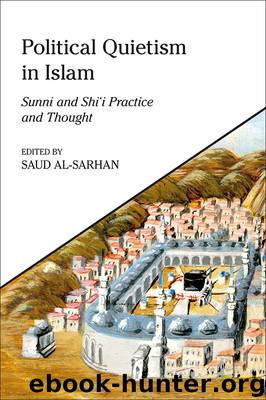Political Quietism in Islam by Saud al-Sarhan;

Author:Saud al-Sarhan;
Language: eng
Format: epub
Publisher: Bloomsbury UK
7
Legal Discourses on Hijra in the Caucasus after the Fall of the Caucasus Imamate: al-Risāla al-Sharīfa by the Dagestani Scholar ʿAbd al-Raḥmān al-Thughūrī
Magomed Gizbulaev
The nineteenth century marked a major turning point in the history of the Caucasus. The long and fierce struggle of the Caucasus imamate against the Russian advance in the north Caucasus ended in victory for the Russian Empire. The annexation of Dagestan, Chechnya, in 1859 and the subsequent conquest of the whole territory of Circassia in 1864 brought a large Muslim population under Russian rule. Governing this population, which was composed of a number of different communities, presented particular difficulties, and the imposition of the colonial administration from 1861, called voenno-narodnoe upravlenie (military people’s administration), and the persecution of Muslims provoked a number of local uprisings in the region. The consequences of these failed uprisings against the tsarist efforts to prohibit the practice of the sharīʿa led to the hijra (migration) of native populations (the 1860s to the 1880s) from the north Caucasus, an area that is famous for the many persecutions its people have suffered. Some Dagestani legal works give the impression that the issue of hijra was widely discussed.
In this chapter, I hope to contribute to our knowledge of the development of legal discourse on the hijra after Russia’s incorporation of the Caucasus by undertaking an analysis, as well as a comparative and textual study, of the formerly unexamined treatise al-Risāla al-sharīfa by ʿAbd al-Raḥmān al-Thughūrī (d. 1882), a work that I discovered in the course of my research as a visiting Fulbright scholar at Princeton University in 2010/2011. From a historical point of view, the study of al-Risāla al-sharīfa should give us some insight into the development of juristic discourse on the enforced Muslim emigration from the Caucasus to the lands of the Ottoman Empire and about the practice and understanding of Islamic international law in Dagestan, in which the notions of dār al-kufr and dār al-islām were used.
Download
This site does not store any files on its server. We only index and link to content provided by other sites. Please contact the content providers to delete copyright contents if any and email us, we'll remove relevant links or contents immediately.
| Africa | Americas |
| Arctic & Antarctica | Asia |
| Australia & Oceania | Europe |
| Middle East | Russia |
| United States | World |
| Ancient Civilizations | Military |
| Historical Study & Educational Resources |
Empire of the Sikhs by Patwant Singh(22763)
The Wind in My Hair by Masih Alinejad(4839)
The Templars by Dan Jones(4557)
Rise and Kill First by Ronen Bergman(4545)
The Rape of Nanking by Iris Chang(4022)
12 Strong by Doug Stanton(3419)
Blood and Sand by Alex Von Tunzelmann(3055)
The History of Jihad: From Muhammad to ISIS by Spencer Robert(2504)
Babylon's Ark by Lawrence Anthony(2428)
The Turkish Psychedelic Explosion by Daniel Spicer(2245)
No Room for Small Dreams by Shimon Peres(2235)
Gideon's Spies: The Secret History of the Mossad by Gordon Thomas(2233)
Inside the Middle East by Avi Melamed(2230)
Arabs by Eugene Rogan(2193)
The First Muslim The Story of Muhammad by Lesley Hazleton(2154)
Bus on Jaffa Road by Mike Kelly(2035)
Come, Tell Me How You Live by Mallowan Agatha Christie(2025)
Kabul 1841-42: Battle Story by Edmund Yorke(1921)
1453 by Roger Crowley(1879)
